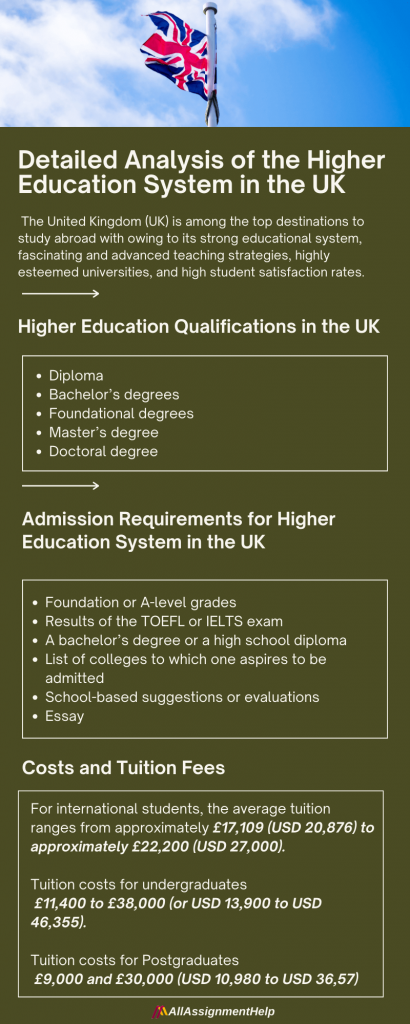Table of Contents
The higher education system in the UK is well-known throughout the world for its excellence and high standards. The United Kingdom (UK) is among the top destinations to study abroad with owing to its strong educational system, fascinating and advanced teaching strategies, highly esteemed universities, and high student satisfaction rates. Furthermore, Universities and other higher education establishments in the UK have been named among the best in the world by publications like Times Higher Education, QS World, and Academic Ranking of World Universities.
With the vast range of universities present in the country, sometimes it becomes difficult for a student to know the higher education system in the UK. Don’t worry! All Assignment Help will provide you with all the information regarding the higher education pattern of the country.
A Brief Overview of the Higher Education System in the UK
UK higher education is renowned across the world for its quality, drawing in international students who significantly boost the economy and cultural life of the country. Below we have given a brief overview of the higher education system in the UK to make you understand it well.
- In the UK, 18 is the starting age for higher education. The UK provides a wide range of degrees for higher education.
- Students who are qualified to study at UK higher education institutions already hold further education degrees, such as A-levels, the International Baccalaureate, or an equivalent qualification, or even a foundation course, from the UK or another country.
- Numerous top-notch programs are available at UK universities and colleges, leading to degrees that are respected and respected by academics and employers everywhere.
- There are 160 universities and colleges in the United Kingdom that provide undergraduate and graduate study programs in every subject.
- The UK has a higher education rate of over 50% among students who choose to major in science, nursing, music, art, management, psychology, etc. Additionally, you can select between a short-term and long-term course as well.
- Furthermore, some universities do not grant degrees but offer bridge courses to help students enter programs that do.
UK higher education system offers world-class facilities for teaching and research. This is why students from all around the world enrolled themselves in UK universities and colleges.
Read Here: Should UK Universities Change Their Education System For International Students?
Higher Education Qualifications in the UK
In the UK, higher education qualifications consist of:
| Diploma | Higher Education institutions in the UK provide two-year diploma programs • Higher National Diploma • Diploma of Higher Education |
| Bachelor’s degrees | A bachelor’s degree in science or engineering, an arts degree, or a bachelor’s degree in education can be obtained in three years. |
| Foundational degrees | Special foundation courses sometimes referred to as “Year 0” programs, are offered by certain colleges and universities to students who wish to major in science or engineering but lack the necessary entrance requirements. |
| Master’s degree | Master’s degrees can be earned in one to four years. The Master of Business Administration, or MBA is the most sought-after postgraduate degree globally with the UK producing the majority of MBA graduates. |
| Doctoral degree | A doctorate is the highest qualification which usually takes three to four years to complete. Additionally, applicants for doctoral programs usually hold very strong first degrees, or more commonly, master’s degrees. |
No matter what education qualification you taking, you need to perform well. However, whenever you find yourself struggling to meet the demands of the higher education system in the UK, you can opt for taking assignment writing service online to get help from experts. Ultimately, this will release the burden from your shoulders and allow you to meet the stringent demands of the UK education system.
Admission Requirements for Higher Education System in the UK
In the UK, students under the age of eighteen must complete Foundation or A-Level preparatory courses to pursue further education, A certificate in hand helps in your university selection. Furthermore, the average entry score requirements vary by faculty and university.
Additionally, a certain level of English language proficiency is another crucial requirement for admission. Student admissions are significantly impacted by their language proficiency. Students take the TOEFL or IELTS exams to get ready for admission. The average English language proficiency score is:
- IELTS – 5.0-5.5+
- TOEFL – 550+
Furthermore, you must apply by October or January to be considered for higher education in the United Kingdom. The procedure is conducted via the university’s official website or the UCAS system for college and university admission. The following paperwork is necessary for admission:
- Foundation or A-level grades
- Results of the TOEFL or IELTS exam
- A bachelor’s degree or a high school diploma
- List of colleges to which one aspires to be admitted
- School-based suggestions or evaluations
- Essay
The application is sent to the universities by UCAS. Students are invited to an interview if they fulfill the prerequisites.

UK Higher Education System: Costs and Tuition Fees
The cost of higher education in the UK is directly correlated with its reputation. There may be differences in tuition costs across universities and between areas. However, attending a British university costs a lot of money, but you can always apply for numerous scholarship programs available.
Additionally, the degree level and study program have an impact on the tuition costs at UK universities.
For international students, the average tuition ranges from approximately £17,109 (USD 20,876) to approximately £22,200 (USD 27,000).
Tuition costs for undergraduates
The price range for international students is from £11,400 to £38,000 (or USD 13,900 to USD 46,355).
Tuition costs for Postgraduates
It costs between £9,000 and £30,000 (USD 10,980 to USD 36,570) for international students.
The UK universities also offer a range of online courses as well. Students can enroll themselves in undergraduate or postgraduate degrees online and can complete the degree without traveling to the university. However, students who are new to online classes might face challenges that can make them think, can someone take my online class for me? This is a common query among most of the students. Thus, to help such students, there are online class takers available who understand the format and requirements of online classes. They will help you whether you need help with complete classes and require a little help from them.
Credit System for Higher Education in the UK
UK universities utilize the Credit Accumulation and Transfer Scheme (CATS) to track and document a student’s progress in various programs. A university or academic credit is a prerequisite for admission to most universities in the United Kingdom. Moreover, every degree has a distinct credit requirement, but, one credit is equivalent to the learning objectives of ten hours of study. Let’s glance at these briefly:
- It takes 300 credits to earn a bachelor’s degree, and 360 credits to earn an honors degree.
- 480 credits are needed for an integrated master’s degree
- 180 credits are needed for a PG-taught master’s degree
- 540 credits are needed for a professional doctorate
In addition, the grading system is a crucial component of the higher education system in the UK. It functions as follows.
University Grading System in the Higher Education in the UK
The UK higher education system uses a special grading system for advanced degrees to be more precise in characterizing students’ academic achievements. Moreover, the academic success of students is indicated by a letter grade scale in UK universities, where an A denotes exceptional performance and an F denotes a fail.
The information is included in the table below:
| Grade Report and Description | Score in Percentage (%) |
| A: Outstanding to Excellent | 70-100 |
| B: Good to Very Good | 60-90 |
| C: Satisfying | 50-59 |
| D: Sufficient | 40-49 |
| E: Unsatisfactory | 30-39 |
| E: Unsatisfactory | 0-29 |
Students with grades of A through D are deemed to have passed, while those with grades of E and F are deemed to have failed.
Furthermore, the undergraduate and graduate degrees can be further subdivided into three categories. The term “honors” is often utilized in undergraduate programs.
Let’s analyze the degree divisions according to scores:
- First-class Degree/Honours: 70% and above
- Second-class Degree/Honours: 50% – 70%
- Third-class Degree/Honours: 40% – 50%
The majority of students enroll in graduate, post-graduate, and professional programs at the top UK universities. However, they need to score the highest to maintain their academic performance. However, scoring the best scores can be made possible by getting professional assignment writing help in UK, where you will be guided by experts who know the ins and outs of the UK higher education system.
How to Choose the University and Best-Fit Course for Your Needs?
The higher education system in the United Kingdom is not lacking in possibilities. Your academic background, interests, desired career path, professional objectives, financial constraints, and other variables will all play a role in the course and university you ultimately choose.
However, before deciding on the course and university, take into account the following important considerations:
- Conduct in-depth research and create a selection of universities that offer courses that align with your interests and academic background.
- Examine these universities standing and accreditation, and carefully consider their curriculum offerings.
- Analyze their resources for education and research, extracurricular activities offered, job and internship prospects, etc.
- Verify whether the university provides any extra benefits, such as grants, scholarships, housing options, etc.
- Check whether the location is both practical and secure for your visit.
- Evaluate living expenses and compare the tuition costs of various universities.
However, you can choose the university and course of study that best suits your needs by taking into account each of these criteria.
Also Read: List of Top UK University To Study For Bright Career
Conclusion
It is a smart choice to pursue higher education in the UK because there are many prestigious universities there with advanced facilities for teaching as well as research. However, you must choose the right university and program structure if you want to take full advantage of the UK higher education system. However, international students also need to be aware of the financial and academic requirements and get ready for the difficulties of studying abroad. In general, pursuing higher education in the UK is a fulfilling experience that leads to many fascinating possibilities.
Who Are We?
Hello, we are AllAssignmenthelp.com, the one-stop destination for all your academic help. We have a team of 2000+ PhD experts who will help you in your online classes and can provide you with assignment writing services. Moreover, the assignment offered by us is plagiarism-free and original. Here, we can help you write assignments based on different academic subjects and take your online nursing class, biology class, accounting class, etc as per the UK university norms and guidelines.
If you need any help contact us now.
FAQs
| Why does the UK have a superior higher educational system than other nations? The UK offers shorter, more intensive courses than many other countries, so you can graduate more quickly without compromising quality. Whereas, an undergraduate program takes three years to complete, a graduate degree or post-graduation can be completed in just one year in the UK. |
| Which entrance requirements apply to the higher education system in the UK? The most popular pathways to study at UK universities are the International Baccalaureate (IB), A-Levels, or the comparable High School Leaver qualification(s) in your home country. |
| How many admission intakes exist in the UK? In the UK, there are three intakes for international students: First: from September to December; Second: from January to April; and Third: from April to June. |
